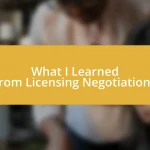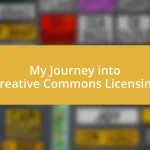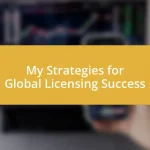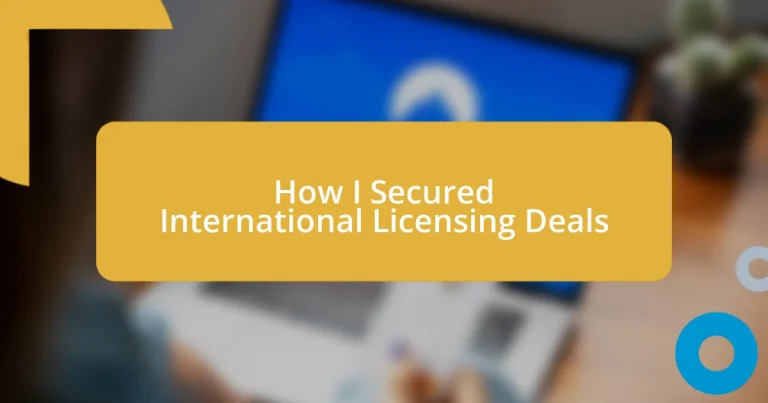Key takeaways:
- Building trust and communication is crucial in international licensing, emphasizing the importance of cultural sensitivity and emotional investment.
- Thorough research of local regulations and market dynamics is essential for successful licensing, highlighting the need to engage local experts.
- Strong licensee relationships are fostered through empathy, flexibility, and celebration of successes, which strengthen partnerships over time.
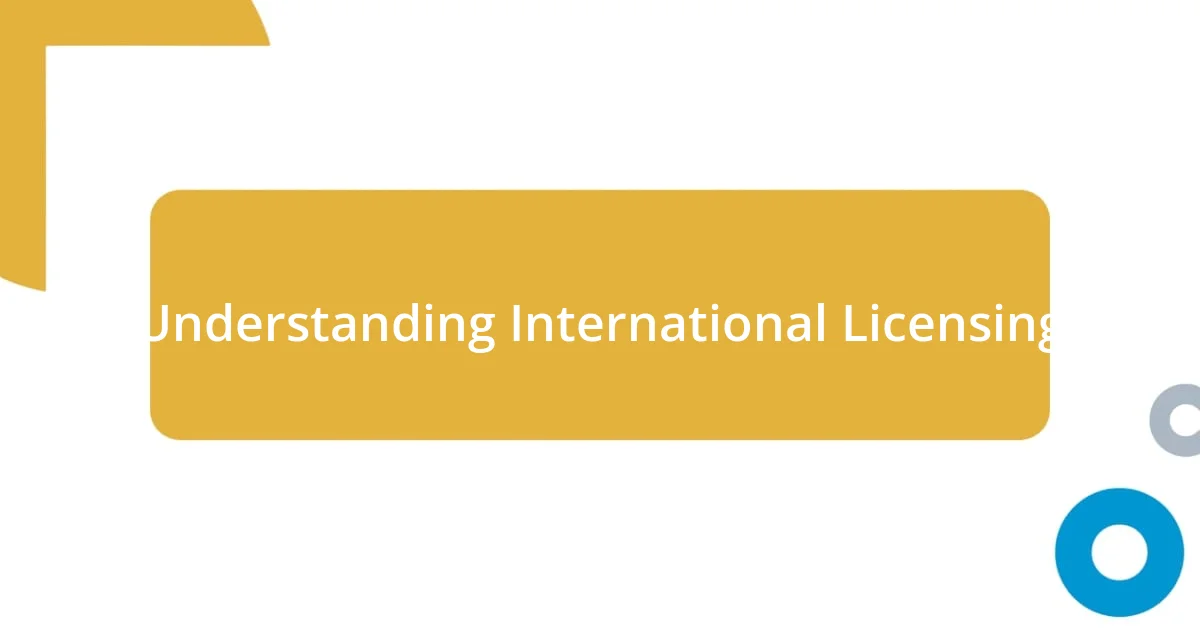
Understanding International Licensing
When I first delved into international licensing, I was struck by how vast and intricate the landscape can be. Understanding the nuances of different laws, cultures, and market dynamics was both exhilarating and daunting. I often found myself asking, “How do I navigate these diverse environments effectively?”
In my journey, I learned that international licensing isn’t just about expanding reach; it’s about building trust and establishing relationships. I remember a pivotal moment when I secured my first deal in a foreign market. The joy of seeing my work recognized internationally, coupled with the sheer pressure of negotiating a contract in another language, made me realize the importance of clear communication and cultural sensitivity.
A common misconception is that international licensing is merely transactional, but it’s so much more than that. It’s about understanding the unique value each market brings and how to adapt your approach accordingly. Reflecting on my experiences, I’ve come to believe that the emotional investment in forging these connections is what truly sets successful deals apart. What’s the driving force behind your interest in international licensing?
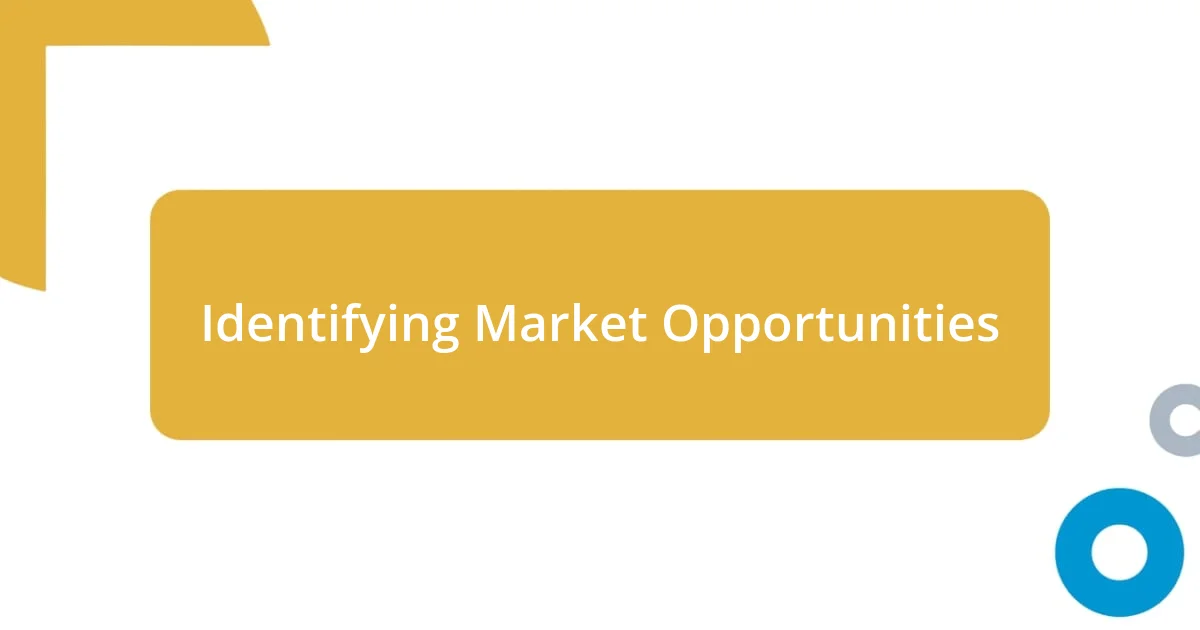
Identifying Market Opportunities
Identifying market opportunities in international licensing can often feel like a treasure hunt. I remember a time when I stumbled upon a niche market that hardly anyone was targeting. The excitement of realizing that my unique product could fill a gap in that region was incredibly motivating. It’s essential to keep a keen eye on emerging trends and cultural shifts.
Here are some strategies that worked for me:
- Research Local Trends: Immerse yourself in local news and social media to understand consumer behavior.
- Attend Trade Shows: These events can be goldmines for insights, allowing you to see trends firsthand and network with potential partners.
- Leverage Local Expertise: Partnering with local consultants can offer invaluable insights into market dynamics.
- Identify Gaps: Look for areas where your products can meet unmet needs or improve on existing solutions.
- Monitor Competitive Activity: Analyze what successful competitors are doing—and consider how you can differentiate your approach.
Each of these strategies has its own story for me. For instance, attending a trade show in a vibrant city opened up conversations that led to unexpected partnerships. The enthusiasm of local entrepreneurs was contagious and reinforced my belief in the power of collaboration.
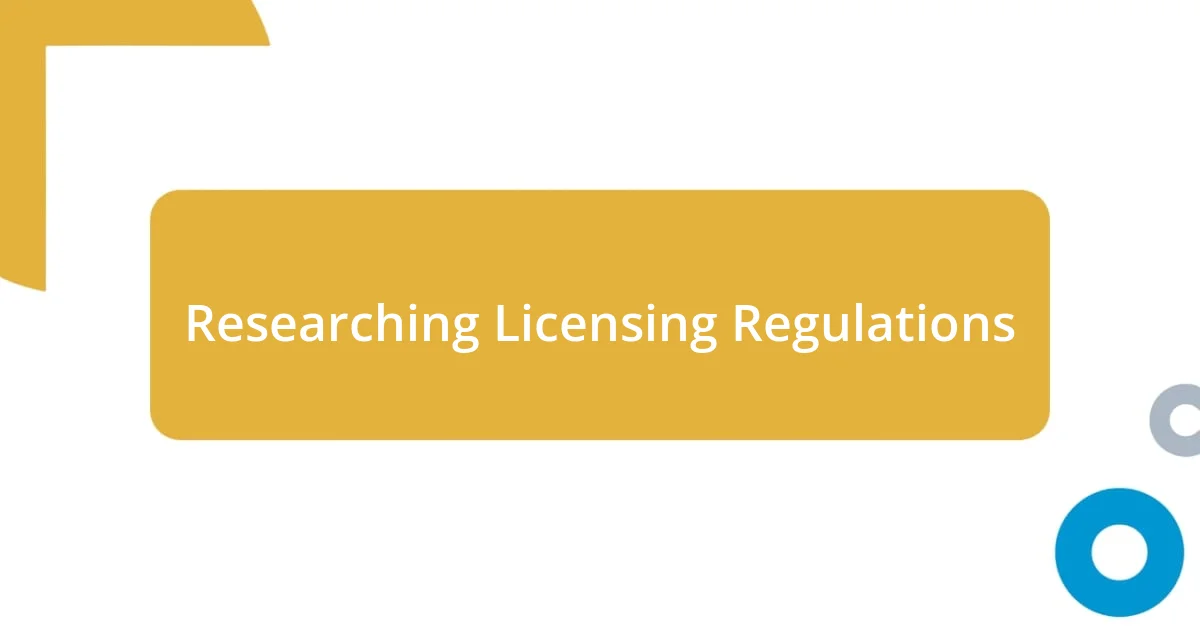
Researching Licensing Regulations
Researching licensing regulations is an essential step that many overlook in the excitement of international deals. I recall spending hours poring over legal documents and government websites, trying to decipher the licensing requirements in various countries. It’s surprising how regulations can differ even between neighboring states. Understanding these nuances not only safeguards your intellectual property but also positions you as a credible partner in the eyes of potential collaborators.
Navigating these regulations was a learning curve for me. In one instance, I underestimated the importance of local laws and faced significant hurdles while trying to secure a deal in a region with strict compliance requirements. It was a wake-up call that made me realize the value of consulting with local legal experts. Engaging professionals who understand the local landscape can save time and prevent costly mistakes down the road.
I found that approaching research methodically led to better outcomes. I created a checklist that included points like fulfilling local licensing requirements, understanding import/export regulations, and even assessing cultural attitudes towards foreign products. By breaking it down, I turned what once felt like an overwhelming task into manageable steps. The relief I felt when I finally secured that initial agreement was indescribable, proving that diligent research pays off in the long run.
| Aspect | Considerations |
|---|---|
| Local Laws | Research specific regulations in each target market. |
| Compliance | Engage legal experts to ensure adherence to local laws. |
| Cultural Understanding | Consider how local culture influences regulations and consumer perception. |
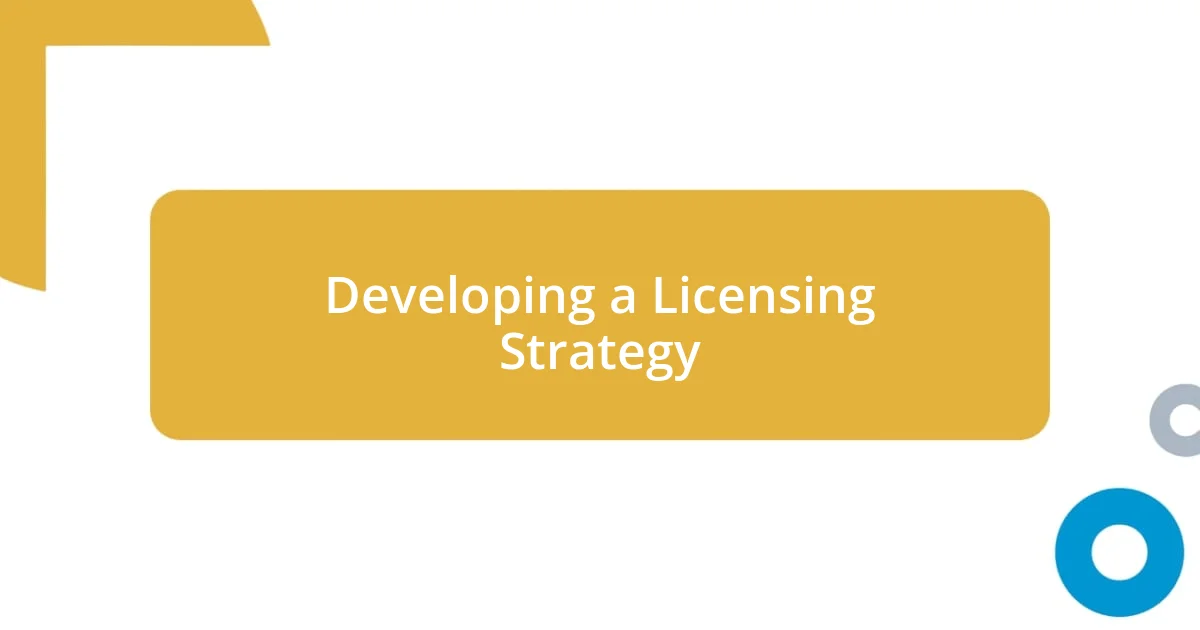
Developing a Licensing Strategy
Developing a licensing strategy requires thoughtful planning and a clear understanding of your goals. I remember the moment I decided to outline my objectives, focusing on which markets I wanted to enter and what I hoped to achieve. This clarity not only kept me motivated but also served as a guiding map throughout the licensing process. Have you ever tried to head in a direction without a plan? It’s easy to get sidetracked without a defined purpose.
A pivotal part of my strategy involved identifying complementary brands or products that could enhance my offerings. Collaborating with a brand that had an established presence helped ease my entry into new markets. One time, I partnered with a local designer who resonated with the audience—suddenly, my products had a greater appeal. Can you imagine the boost in credibility and excitement that partnership brought? The magic often lies in finding synergies that create a win-win scenario.
Finally, I believe that flexibility is crucial in your licensing strategy. My first licensing deal didn’t unfold as I expected, which taught me to adapt and pivot as needed. I allowed feedback from partners and market performance to shape my approach moving forward. Were there moments of doubt? Absolutely. But embracing change made my strategies more robust and led to opportunities I hadn’t initially considered.
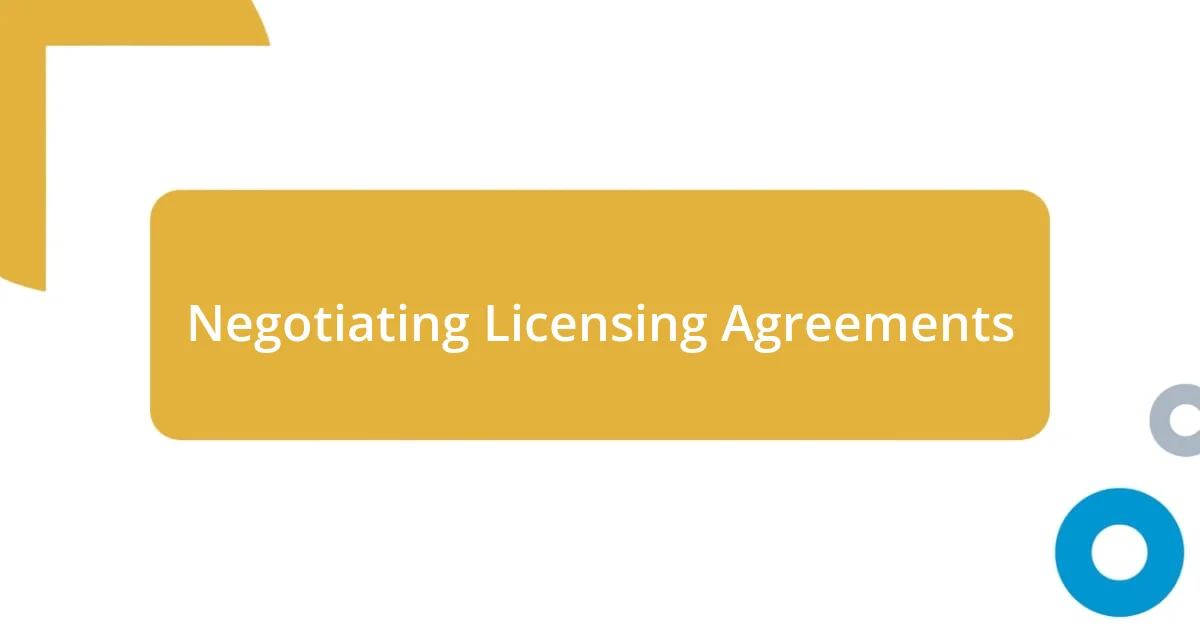
Negotiating Licensing Agreements
Negotiating licensing agreements can often feel like navigating a minefield. When I embarked on my first negotiations, I quickly learned the importance of approaching these discussions with both confidence and humility. I vividly recall a tense meeting where I felt overwhelmed by the other party’s experience. But as I expressed my passion and commitment to the partnership, I saw their demeanor shift, reinforcing the value of authenticity in negotiations.
There were instances when I misjudged the priorities of my potential partners. One particular negotiation left me frustrated, as I focused solely on what benefited my side, forgetting that collaboration is a two-way street. When I finally shifted my perspective, genuinely considering their needs and priorities, I saw an unexpected breakthrough. Isn’t it fascinating how empathy can turn a challenging conversation into a productive dialogue?
I also discovered that clear communication is vital. Early on, I made the mistake of assuming we were on the same page about key terms. A casual back-and-forth led to a misinterpretation that almost derailed the deal. Now, I prioritize summarizing points throughout discussions to ensure mutual understanding. It may seem simple, but it aligns expectations and builds trust—both essential elements for a successful licensing agreement.
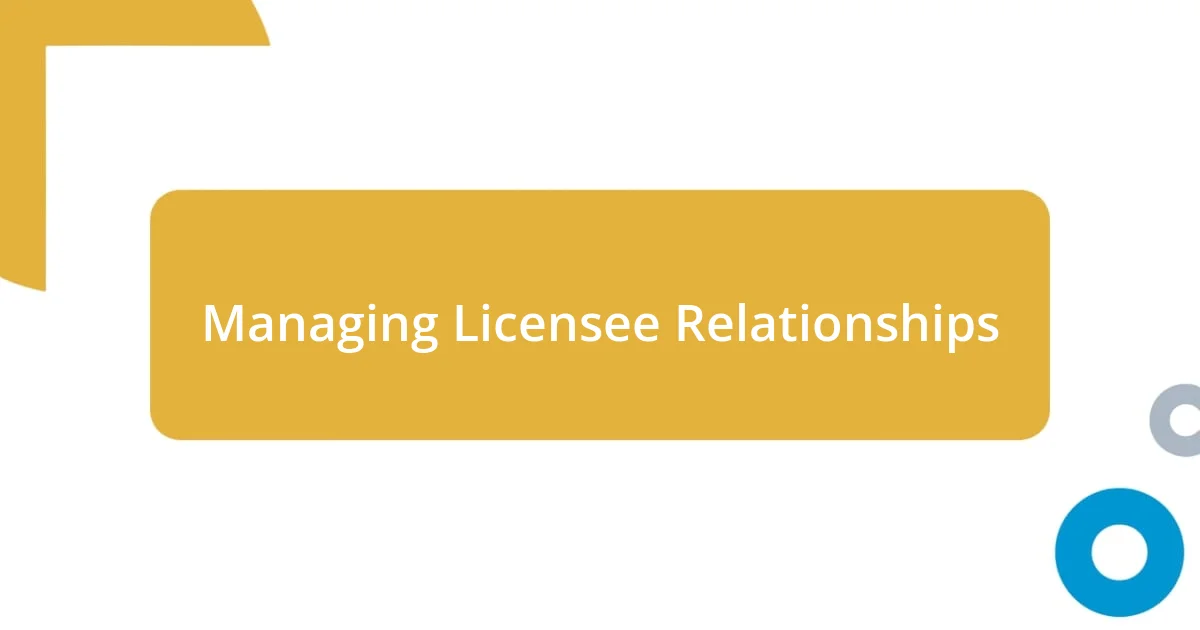
Managing Licensee Relationships
Building strong relationships with licensees is essential for long-term success. I remember my first licensing deal where I was excited yet anxious about maintaining that connection. It turned into a rewarding experience, as I learned that regular check-ins can make a tremendous difference. Have you ever felt that a simple conversation helped deepen a relationship? For me, those informal chats not only solidified our partnership but also fostered open dialogue around challenges and opportunities.
Trust forms the foundation of any successful licensee relationship. I discovered this firsthand during a project where my licensee faced unexpected production delays. Instead of reacting with frustration, I chose to approach the situation with empathy. By sharing my own experiences of setbacks, we found common ground and brainstormed solutions together. Isn’t it interesting how vulnerability can strengthen relationships and build trust? It was a turning point that reassured me of the importance of fostering a supportive environment.
Ultimately, it’s essential to celebrate successes, both big and small. Early in my career, I had a licensee who exceeded their sales targets. I remember organizing a small celebration to acknowledge their efforts. Reflecting on that moment, I realize how such gestures not only motivate the licensee but also deepen the partnership. When has a simple acknowledgment made a difference in your relationships? Those moments of appreciation can truly transform the dynamics of your collaborations.
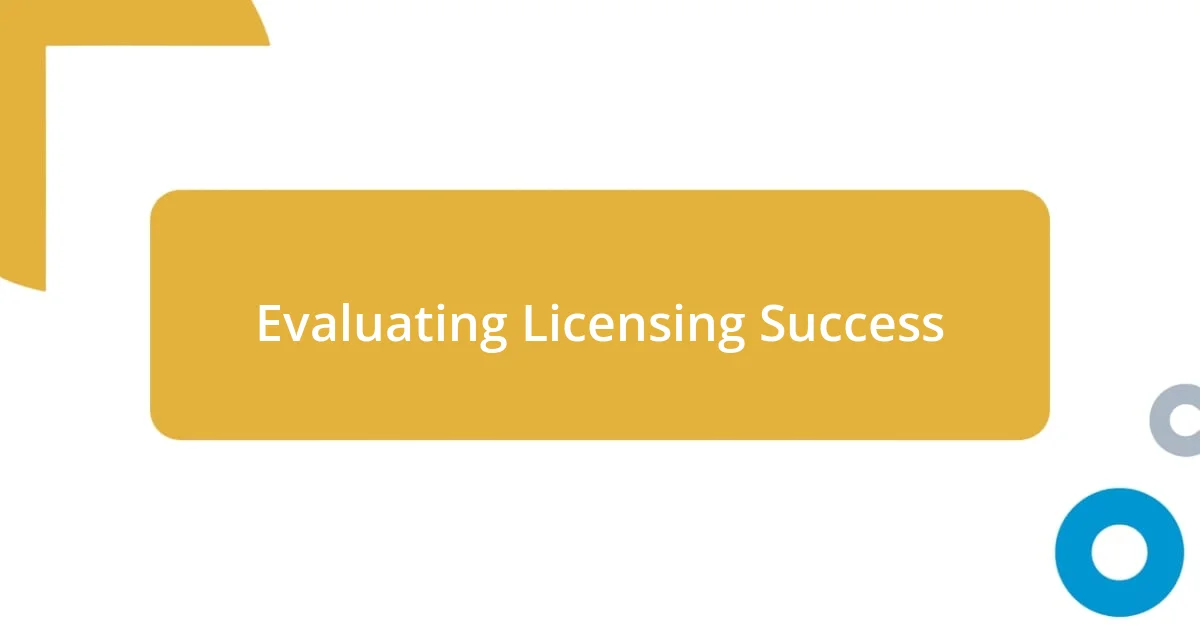
Evaluating Licensing Success
Evaluating licensing success goes beyond mere numbers; it’s about understanding the whole picture. In my experience, I found that setting clear objectives at the start helped immensely. I recall a situation where we aimed for a specific sales figure, but the true measure of success was the partnership’s growth and brand visibility. Have you ever realized that success can look different than what you initially thought?
Feedback plays a pivotal role in this evaluation process. I distinctly remember gathering insights from several licensees after a product launch. Their perspectives were invaluable; they highlighted strengths I had overlooked and areas needing improvement. This collaborative evaluation not only adjusted our strategies but also reinforced our bond. Isn’t it fascinating how looking outward can often reveal paths for inward growth?
Data analysis is another crucial aspect of assessing licensing success. Initially, I was hesitant to dive into the numbers. However, analyzing sales trends unveiled a wealth of insights that guided our future endeavors. I learned that while it may feel intimidating, deciphering the metrics is a necessary skill. It’s intriguing to think how these figures tell a story about the overall health of the partnership—what patterns have you noticed in your own collaborations?


